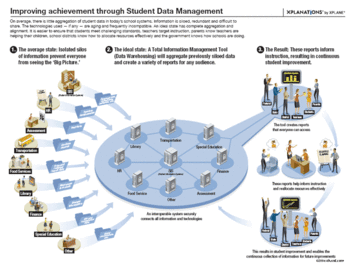The personal impact of data management.
Some time ago I began feeling odd.After a few Google searches to get a better idea of what my symptoms could be attributed to we decided to go to the emergency room.
A number of tests later it was decided I needed to have my appendix removed.
 |
| Diagram showing the importance and result of well thought out Student Data Management. (Photo credit: Wikipedia) |
I have been to this particular hospital a few times for various tests, so they already had my insurance and contact information, yet when they sent someone from admissions they had to re-confirm all of my insurance, contact and emergency notification information.
I said to the lady that it was in the system, since nothing has really changed. The response I received was that they upgraded to a new patient care system in December. They have access to the historical data for records purposes but they have to re-enter the patient information into the new system whenever a previous patient comes in for a current visit.
I was already medicated, so little of the rest of the conversation do I remember.
I basically handed over my license and insurance information and did my best to answer her questions.
However, I do remember this part of the conversation, because this is what I do.
I manage data.
The mental image ran through my mind of some management team discussing the complications of migrating historical data from the legacy system into a new system. (A discussion I have been a part of on numerous occasions.) I could see the person at the head of the table shaking their head and saying:
"It will cost too much money to do a historical migration of everything. We will only migrate enough data from the old system to the new system to keep things going. Any historical patient data is not that important."
I had pretty much heard those exact words from a CIO before.
As I have written before, the historical data you have represents your customers. Ignoring their history is to ignore your own history. What would be the effect, if every time you went in to a bank you had to fill out all of the forms for opening an account?
Each, and every time?
Now I do more with understanding the nuances of what the data represents, and why customers,patients,prospects, or other things that data represents are doing the things they are doing.
This episode stuck with me for some time, and I hope that we as those that are responsible for data recognize that the data we work with represents real living breathing people.
Historical data is important.
Ignore it at your peril.


No comments:
Post a Comment